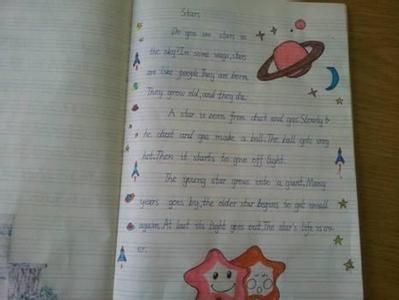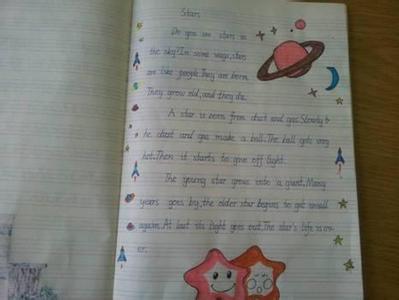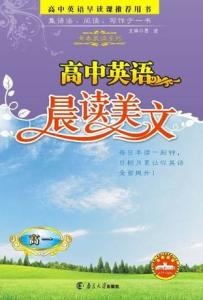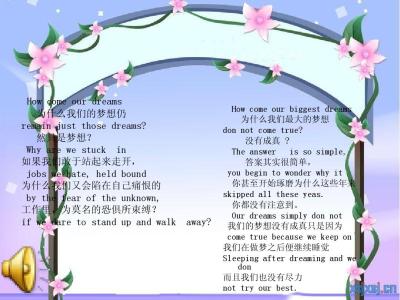把教育的话题与隐含着教育内容的美文相互整合,把教育内容融合在相关美文中,引导学生在感悟美文之余受到思想的感染、熏陶与启迪。小编分享关于高中英语美文,希望可以帮助大家!
关于高中英语美文:到美国法庭看一看
In America, courtroom proceedings are generally open to the public and can,within strict guidelines, be reported on in newspapers and on radio and television. We use the word “allegation” and its verb form “allege”to indicate that charges brought against a person have not been proven.Cameras are also generally barred from courtrooms to protect the identities of thejurors,unless special permission is given by the judge.A jury, by the way, consists of from six to twelve ordinary citizens who are chosen by lottery to hear acase and decide,under instructions from the judge, on whether the persons being tried are guilty or innocent.In some cases which attract widespread public interest,permission is given to televise the proceedings if and only if the television cameras never photograph the members of the jury.
An exception to the rule ofopen proceedings are the proceedings of a Grand Jury.Grand Jury proceedings arealways secret. In this instance,a jury is convened not to judge a defendant guilty or not guilty but to decide if sufficient evidence is on hand to bring charges against someone and begin a public trial.The secrecy of the grand jury proceedings is considered necessary to protect the integrity of the testimony and theevidence which may be brought forward later in a public trial.The secrecy prevents any future jury membersfrom having formed an opinion about the case before the facts are known; and it protects the reputations of people who may have been wrongfully or unnecessarily accused of a crime.The fundamental rule of Americanlegal practice is that a person accused of a crime is innocent until proven guilty.The people accusing or prosecuting the defendant must prove through facts and testimony that the person is guilty “beyond a reasonable doubt.”
在美国,法庭的诉讼程序一般是公之于众的,并且依照严格的规定,可以让报纸、广播和电视等传媒进行报道。我们使用allegation"无充分证据的指控”一词(其动词形式是allege) 表明对某人的指控尚未得到证实。法庭上一般禁止摄影拍照以保护陪审员的身份。除非获取法官的特别许可, 让我顺便解释 —下陪审团:一个陪审团通常由6名至12名普通公民组成。这些成员用抽签法选定,到法庭听讼,并在法官的指导下决定被指 控的人有罪还是无罪。一些能吸引广大公众兴趣的案子,准许用电视播放整个过程,但绝对不能将电视镜头瞄向陪审团的成员。
大陪审团的诉讼程序并不遵循公开诉讼程序的规定。大陪审团的诉讼程序总是保密的。在这种情形中,一个陪审团召集起来并非去判断一位被指控的人有罪还是无罪,而是决定是否已收集到充足的证据来指控某人并着手准备公开审讯。大陪审团的诉讼程序的保密性对保证证词和证据的完整性是必要的,因为证词和证据在曰后的公开审判中会公之于众。保守秘密能使曰后的陪审员不致在亊实水落石出前就对案件形成自己的息见,也能保护那些道到错误指控或无端指控的人的声誉。美国法律最基本的原则是受到犯罪指控的人在最后被证实为有罪之前是无罪的。控告或起诉被告的人必须提供充足的事实和证词证明被告不容置疑"地有罪。
关于高中英语美文:人与机会
The lack of opportunity is ever the excuse of a weak, vacillating mind. Opportunities! Every lifeis full of them. Every lesson in school or college is an opportunity. Every examination is achance in life. Every businesstransaction is an opportunity-an opportunity to be polite, anopportunity to be manly, an opprtunity to behonest, an opprtunity to make friends. Everyproof of confidence in you is a great opportunity. Every responsibility thrust upon yourstrength and your honor is priceless. Existence is the privilege of effort,andwhen thatprivilege is met like a man, opportunities to succeed along the line of your aptitude will comefaster than you can use them.
Young men and women, why do you stand here all the day idle? Was the land all occupiedbefore you were born?Has the earth ceased to yield its increase? Are the seats all taken? Thepositions all filled? the chances all gone? are the resources of your country fully developed? Arethe secrets of nature all mastered? Isthere no way in which you can utilize these passingmoments to improve yourself or benefit another? Don't wait for your opportunity. Make it,make it as Napoleon made his in a hundred "impossible" situations. Make it, as all leaders ofmen , in war and in peace, have made their chaces of success. Make it, as every man must, whowould accomplish anything worth the effort. Glolden opportunities are nothing to laziness,butindustry makes the commmonest chances golden.
意志脆弱优柔寡断的人,总是以缺乏机会为借口.机会!在每个人的生活当中,无处不在.学校里的每一节课都是机会.每一场考试都是人生的契机.每一次商务往来都是一次机会---一次礼貌待人的机会.一次果敢行事的机会.一次诚实守信的机会,一次广交朋友的机会.每一分对你的信任,对你都是一次莫大的机会.基于你的才干和声望而寄予你的每一份责任,都是无价的.生存是奋斗赋予的特权,而当你如男子汉一般邂逅那份殊荣时,一个个发挥你聪明才智,助你获取成功的机会便会接踵而至,令你迎接不暇.
年轻人啊,为何你们整日裹足不前而虚掷光阴?难道在你们出生之前,每一寸土地都已被他人所占据?难道地球已不再繁衍生息?难道所有的席位都已另有归属?所有的职位都已人满为患? 所有的机会都一去不返?难道你国内的资源都已开发殆尽?难道大自然的奥秘都已了如指掌?难道你无法抓住转瞬即逝的时机来改善自我或者造福他人?切末株守机会.去创造它,正如拿破仑在无数次"绝"境中创造自己逢生的机会一样.去创造它,正如战争或和平年代的领袖们创造他们取得胜利的机会那样.去创造它,人人必须如此,任何人都能获得应有的回报.对于懒惰来讲,天赐良机也会化为乌有;对于勤奋而言,即使是微不足道的机会,也会变得金光闪闪!
关于高中英语美文:生活的艺术
The art of living is to know when to hold fast and when to let go.For life is a paradox: it enjoins us to cling to its many gifts even while it ordains their eventual relinquishment. The rabbis of old put it thisway: “A man comes to this world with his fist clenched, but when he dies, his hand is open.”Surely we ought to hold fast to life, for it is wondrous, and full of a beauty that breaks through every pore of God’s own earth. We know that this is so, but all too often we recognize this truth only in our backward glance when we remember what was and then suddenly realize that it is no more.We remember a beauty that faded, a love that waned. But we remember with far greater pain that we did not see that beauty when it flowered,that we failed to respond with love when it was tendered.
A recent experience re-taught me this truth. I was hospitalized following a severe heart attack and had been in intensive care for several days. It was not a pleasant place.One morning, I had to have some additional tests. The required machines were located in a building at the opposite end of the hospital, so I had to be wheeled across the courtyard on a gurney.As we emerged from our unit, the sunlight hit me.That’s all there was to my experience. Just the light of the sun. And yet how beautiful it was—how warming, how sparking, how brilliant! I looked to see whether anyone else relished the sun’s golden glow, but everyone was hurrying to and fro,most with eyes fixed on the ground. Then I remembered how often I, too, had been indifferent to the grandeur of each day, too preoccupied with petty and sometimes even mean concerns to respond from that experience is really as commonplace as was the experience itself:life’s gifts are precious,but we are too heedless of them.
Here then is the first pole of life’s paradoxical demands on us: never too busy for the wonder and the awe of life. Be reverent before each dawning day. Embrace each hour. Seize each golden minute.Hold fast to life, but not so fast that you cannot let go. This is the second side of life’s coin, the opposite pole ofits paradox: We must accept our losses, and learn how to let go.This is not an easy lesson to learn, especially when we are young and think that the world is ours to command, that whatever we desire with the fullforce of our passionate being can,nay will be ours. But then life moves along to confront with realities,and slowly but surely this truth dawns upon us.At every stage of life we sustain losses,and grow in the process.
We begin our independent lives only when we emerge from the womb and lose its protective shelter. We entera progression of schools, then we leave our mothers and fathers and our childhood homes. We get married and have children and then have to let them go. We confront the death of our parents and our spouses. We face the gradual or not so gradual waning of our strength. And ultimately, as the parable of the open and closed hand suggests, we must confront the inevitability of our own demise, losing ourselves as it were, allthat we were or dreamed to be.
生活的艺术是要懂得如何取舍。因为生活本身自相矛盾:它一面告诫我们珍惜它所赐予的诸多恩惠,一面又注定最终将其全部收回。古时犹太教的拉比对此这样诠释:“一个人初降人世时手紧握成拳,撒手人寰时却手掌张开。”我们当然应该牢牢抓住生活,因为它奇妙无比、美不胜收,渗透了上帝的每一寸土地。我们明白这一点,但往往是在忆及往事、蓦然回首却发现好景不再时才有所感触。我们记得凋零的美,消褪的爱。但我们更痛楚地忆起,在美丽绽放时没有欣赏那份美丽,在情意绵绵时没有回应那份爱意。
最近的经历让我重新认识到这个真理。在严重心脏病发作后,我被送进医院,在重症室住了好几天。那可不是令人愉快的地方。一天早晨,我不得不再做些其它检查。所需的器械在医院对面尽头的一幢楼里,因此我必须被推着从院子经过。检查完出来时,阳光照在我身上。那是我当时感受到的一切。和煦的阳光,多么美丽,多么温暖,多么耀眼,多么灿烂!环顾四周,想看其他人是否也在欣赏这金灿灿的阳光,但来来去去的每个人都行色匆匆,眼睛大都盯着地面。这时,我忆起我也经常因被琐碎、有时甚至毫无意义的事占据头脑而每天对这样壮观的景色熟视无睹。就在那一刻,我突然意识到生活的馈赠是多么珍贵,而我们却忽视了它们。
这就是生活自相矛盾要求我们的第一极:不要因生活过于忙碌而忽略了它的奇妙和庄严。在每个黎明到来之前心怀敬意。拥抱每一小时。抓住珍贵的每分钟。抓住生活,但不要抓得太紧,以致于无法放弃。这是生活硬币的另一面,也是其矛盾的另一极:我们必须接受失去,并且学会放弃。要学会这一课并非易事,尤其当我们年轻气盛时,自认为是世界的主宰,认为用充满激情的躯体全力追求的东西能够,而且最终将会是我们的。但光阴荏苒,面对现实,我们才渐渐明白并非如此。在人生的每个阶段我们都会蒙受损失,并在此过程中成长。
我们只有脱离母体、失去庇护所时才开始独立生活。我们进入各级学校,然后离开父母。我们结婚生子,然后再放飞子女。我们面对父母和配偶的离世。我们逐渐或很快变得衰弱。最终,如同张开和握紧的手的寓言,我们必须面对不可避免的死亡,失去原来的自 我,失去我们原有的或梦想的一切。
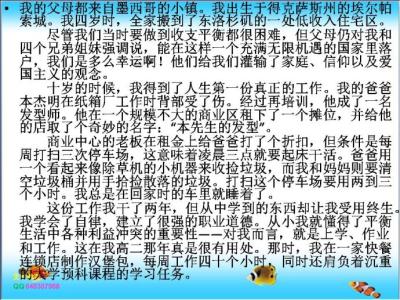
 爱华网
爱华网